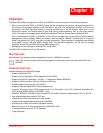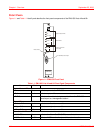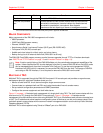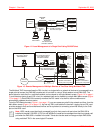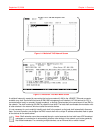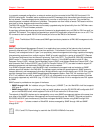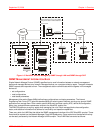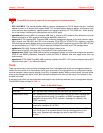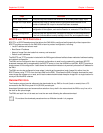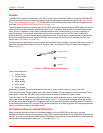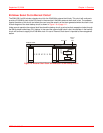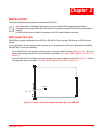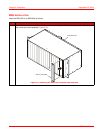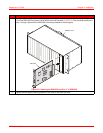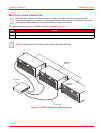
September 25, 2006 Chapter 1: Overview
LTPE-UM-3159-02 1-9
BOOTP AND TFTP PROTOCOLS
BOOTP is a UDP/IP-based protocol that allows the EMU-830 to configure itself dynamically without supervision.
BOOTP provides a means for the EMU-830 to learn its protocol configuration, including:
• Local IP address and subnet mask
• Boot Server IP address
• Name of image file to be loaded into memory and executed
• Default router addresses
The BOOTP and TFTP protocols included with the EMU agent software facilitate these methods of software loading
and network configuration.
The EMU can be configured to learn its protocol configuration at reset from the network (by sending a BOOTP
broadcast message that is recognized by the BOOTP server) or from the NVRAM on the EMU. BOOTP provides a
simple means of unit configuration. It also allows the network administrator to dynamically allocate the IP address for
the EMU.
The EMU can also be configured to know where it should get its operational code (image file): either from the
BOOTP server using TFTP or from the flash RAM on the EMU. This allows the EMU to always download the most
recent image file at power-on or reset, and it lets the network administrator keep the image file in a single location for
use by all the WorldDSL shelves.
XMODEM PROTOCOL
The Xmodem protocol permits software to be downloaded to any EMU or line unit (local or remote) from a PC
connected to the EMU front panel V.24 (RS-232) console port.
Associated Upload menus and screens allow selection of any shelf in the network and the EMU or any line unit in
the shelf as the upload target.
The EMU and each line unit is reset and runs the new code following the software download.
Power supply failure Enterprise trap that indicates the failure of a -48 V shelf power supply input.
Multiple DSL loops down Enterprise trap used to indicate when the programmable threshold of the
number of downed DSL loops in the shelf has been exceeded.
System configuration
change
Enterprise trap that signals when a change has occurred in the physical
configuration of the system, such as the insertion or removal of LTUs/STU-Cs.
Line unit configuration
change
Enterprise trap that signals when a change has occurred in the configuration of
a line unit (includes alarm severity settings, circuit IDs, and loopback modes).
Do not abort the download procedure when an XModem transfer is in progress.
Traps Definition



